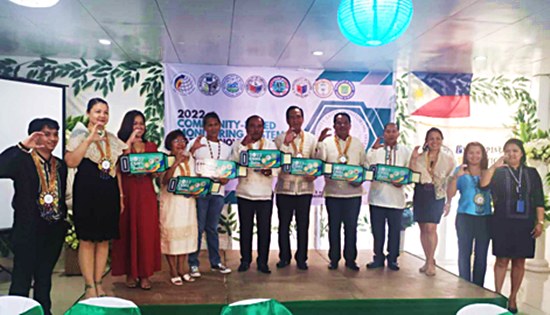PSA turns over 2022
CBMS data to 7 LGUs of Biliran Province

By
PSA-8
October 23, 2023
NAVAL, Biliran –
The Philippine Statistics Authority -Regional Statistical Services
Office VIII (PSA - RSSO 8) and Provincial Statistical Office (PSO) -
Biliran, turned over the 2022 Community-Based Monitoring System
(2022 CBMS) results to the seven (7) out of eight (8) municipalities
of Biliran, namely: Almeria, Biliran, Cabucgayan, Caibiran, Culaba,
Kawayan, and Maripipi. The Data Turnover Ceremony (DTC) marked a
significant milestone of the province and its municipalities.
PSA RSSO 8 Regional
Director Wilma A. Perante commended the seven (7) municipalities for
their full support and cooperation in the 2022 CBMS implementation
in their respective municipalities. She mentioned that of the 6
provinces in the region, Biliran is the first province to cover all
its municipalities. With CBMS as a tool in diagnosing the extent of
poverty, the LGUs will be able to positively target the program
beneficiaries in their locality. CBMS enhances local development
planning and monitoring of progress. It will also help them attain
the Sustainable Development Goals (SDGs) of the municipality.
Director Perante mentioned
that the use of Computer-Aided Personal Interview (CAPI) for
household enumeration and Computer Assisted Web-based Interview (CAWI)
for barangay profiling facilitated the entire CBMS operation.
Director Perante thanked the Local Chief Executives (LCEs) for
leading the 2022 CBMS implementation, as well as the enumerators,
processors, supervisors and barangay officials who all contributed
to its success.
National Statistician and
Civil Registrar General Claire Dennis S. Mapa, in his recorded
message, said that the CBMS Data Turn-Over Ceremony marks a
remarkable achievement in its quest for a local level data. He
thanked all LGUs for their full support and dedication in uplifting
the lives of their constituents through CBMS. He further emphasized
that with CBMS, LGUs can now make informed decisions. He encouraged
the local officials to turn data into meaningful actions and make
CBMS an integral part of their governance framework.
Provincial Director Jesus
P. Naquila of the Department of the Interior and Local Government (DILG)
narrated his experience with CBMS as a tool in planning,
identification and prioritization of programs at the local level
given the meager resources of the government. He said that CBMS can
also be used as a tool in outsourcing funds that will promote
betterment of lives of their people.
PSA RSSO 8 Chief
Statistical Specialist (CSS) Mae R. Almonte presented the 2022 CBMS
highlights of the Municipalities of Almeria, Biliran, Cabucgayan,
Caibiran, Culaba, Kawayan, and Maripipi on the following: basic
services such as access to electricity, internet, main sources of
water, households’ perception on safety when walking alone in the
community, household food insecurity experience in the past 12
months socio-demographic characteristics, education, labor force and
employment, senior citizen’s living alone, and person’s with
disability.
Symbolically the local
officials of the LGUs of Biliran accepted the CBMS data and
expressed their gratitude to PSA for the CBMS data turned over to
them, to wit:
Mayor Myra A. Cabrales of
Biliran represented by William P. Uy, Mayor Richard D. Jaguros of
Almeria, Mayor Gemma G. Adobo of Cabucgayan represented by Rosalie
R. Agang, Vice-Mayor Linda Baleyos of Caibiran, Mayor Humphrey B.
Olimba of Culaba, Mayor Manolo D. Rubi of Kawayan, and Mayor Joseph
C. Caingcoy of Maripipi.
The LCEs expressed their
commitment to use the 2022 CBMS results for the betterment of the
lives of their constituents. The MPDCs of the 7 LGUs discussed the
different uses of CBMS data in their respective municipalities. As
managers of their CBMS data, they promised to comply with the
requirements of the Data Privacy Act.
In closing, CSS Renavil V.
Cueva of PSO Biliran thanked everyone for their support and cited
that the collective effort of the government to have a localized
data paved the way to the success of CBMS. With the CBMS data now
turned over to LGUs, she hoped that the results will be cascaded to
the department heads of respective municipalities to ensure that
data will be utilized.
CBMS is an organized
technology-based system of collecting, processing and validating
necessary disaggregated data that may be used for local planning,
program implementation, and impact monitoring while empowering
communities to participate the process. It involves the generation
of data at the local level, which serves as basis in targeting
households for government programs geared towards poverty
alleviation and economic development.